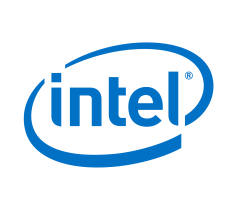
Intel Corporation is an American multinational company that specialises in the production of chips. According to its revenues, it is the world’s largest producer of semiconductor chips. The company is active in different areas of the IT industry including IoT, 5G, and AI.
ARTIFICIAL INTELLIGENCE
From a business point of view, Intel actively participates in the field of AI through a number of its technologies. For instance, its CPU-based systems are used to perform AI-driven medical imaging, while companies like Mastercard are using Intel AI analytics to detect credit card fraud. Intel neural network processors are being used for intensive deep-learning training and its ethernet products are used to run analytics and AI workloads on servers. In addition, Intel revealed the first AI chips in 2019 that are being used to train AI systems.
Intel is making its AI solutions available to government agencies, noting, for instance, that ‘combined with deep learning, satellite images and overheard video can unlock new possibilities in defense, disaster response, and mapping’. In 2017, Intel was selected by the US Defense Advanced Research Projects Agency (DARPA) to contribute to the ‘development of a powerful new data-handling and computing platform that will leverage machine learning and other AI techniques’, in the context of the Hierarchical Identify Verify & Exploit (HIVE) programme. The company is also developing unmanned aerial vehicles.
Intel is contributing to public discussions on AI-related public policy issues. In 2017, the company recommended public policy principles for AI, including fostering innovation and open development, creating new employment opportunities, re-thinking privacy, and requiring accountability for ethical design and implementation. The company has also released an AI Privacy Policy White Paper that explores how individuals’ privacy and data can be protected in the AI industry.
In 2019, Intel released recommendations for the US national strategy, advocating for an approach that ‘advances US industrial competitive advantage, improves quality of life, and maintains the nation’s AI technology leadership on the world stage’.
The company is also involved in AI capacity development. Intel AI Academy offers free AI courses to software developers, data scientists, and students who are interested in learning about AI.
INTERNET OF THINGS
In 2014, Intel released its annual report where it made its ambitions in the field of IoT clear by underscoring, ‘Our vision is: If it is smart and connected, it is best with Intel’. Today, Intel technology powers the IoT through its hardware and software solutions such as chips, security software, and operating systems. Its processors including Intel Quark, Intel Atom, and Intel Core are all used to power IoT. The company also provides smart city solutions.
In 2018, Arm Holdings partnered with Intel to use Intel standards in order to securely manage networked devices.
The company also contributes to discussions on the public policy implications of IoT, especially in the field of security.
AUGMENTED/VIRTUAL REALITY
Intel seems to be more active in the field of virtual reality (VR) than augmented reality. The company produces Intel Core i9 processors which are used in the running of VR from PCs. Intel is also involved in the VR industry through the production of wireless technology known as Wireless Gigabit that powers the VR headset.
Intel, together with Oculus and ESL, has established the first VR e-sports league known as VR Challenger League.
In 2018, Intel released its Vaunt (Superlight) smart glasses developed by its New Device Group. However, after failing to find partners who were willing to bring expertise in design and distribution, Intel decided to drop its augmented reality project.
Intel also partners with other companies, such as HTC and Microsoft, in the development of VR equipment.
QUANTUM COMPUTING
Most of Intel’s work in quantum computing revolves around research. Intel’s Lab is working on the development of quantum processors. Tangle Lake, third generation quantum processors are currently being manufactured and shipped to the Netherlands where they are being tested by QuTech, an advanced research and education centre for quantum computing established by the Netherlands Organisation for Applied Research and the Delft University of Technology. The company predicts that its quantum computing production will be operational in the coming ten years.
Intel is also conducting research on quantum computing in cooperation with the University of Toronto and the University of Chicago.
5G
In terms of 5G, Intel offers a wide range of services. Aside from being involved in the development of 5G infrastructure, including adapters and chips for wireless 5G base stations, the company also facilitates network optimisation and provides learning resources on the technology.
Intel has recently concluded a partnership with Finland’s Nokia in order to facilitate its transition to 5G.
ARTIFICIAL INTELLIGENCE
- Works to advance the development of AI solutions for private and government use.
- Advocates for accountability and ethics in the development and use of AI applications.
- Supports the USA in its mission to maintain AI leadership.
INTERNET OF THINGS
- Works to advance the development of IoT solutions for private and government use.
AUGMENTED/VIRTUAL REALITY
- Works to advance virtual reality research and development.
QUANTUM COMPUTING
- Works to achieve leadership in quantum computing research and development.
5G
- Works to achieve leadership in 5G edge computing and semiconductor chip-manufacturing.